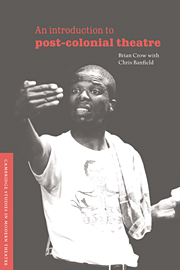Book contents
- Frontmatter
- Contents
- Preface
- Acknowledgements
- Introduction
- 1 Derek Walcott and a Caribbean theatre of revelation
- 2 August Wilson's theatre of the blues
- 3 Jack Davis and the drama of Aboriginal history
- 4 Wole Soyinka and the Nigerian theatre of ritual vision
- 5 Athol Fugard and the South African ‘workshop’ play
- 6 Badal Sircar's Third Theatre of Calcutta
- 7 Girish Karnad and an Indian theatre of roots
- Conclusion
- Further reading list
- Index
1 - Derek Walcott and a Caribbean theatre of revelation
Published online by Cambridge University Press: 26 February 2010
- Frontmatter
- Contents
- Preface
- Acknowledgements
- Introduction
- 1 Derek Walcott and a Caribbean theatre of revelation
- 2 August Wilson's theatre of the blues
- 3 Jack Davis and the drama of Aboriginal history
- 4 Wole Soyinka and the Nigerian theatre of ritual vision
- 5 Athol Fugard and the South African ‘workshop’ play
- 6 Badal Sircar's Third Theatre of Calcutta
- 7 Girish Karnad and an Indian theatre of roots
- Conclusion
- Further reading list
- Index
Summary
When Frantz Fanon made his remarkable analysis of the psychoexistential nature of relations between dominators and dominated under colonialism, he admitted that he was writing from the specific perspective of an educated Antillean, and that therefore ‘my observations and my conclusions are valid only for the Antilles’. But at the risk of self-contradiction he also insisted, a little later in the same work, that ‘the same behaviour patterns obtain in every race that has been subjected to colonization’. It may be that though the same behaviour patterns do indeed apply more or less universally, they may be more in evidence in, and more acutely relevant to, certain conditions of subjection than to others. There is at least the possibility that Fanon7s insights into the problematic complexities of interpersonal relations, in a racist and colonial context, spring not just from his particular vocational interests as a psychiatrist but derive, more generally, from the distinctive character of colonial forms of domination in the Caribbean. Marked by its distinctive history of plantation slavery and ethnic multiplicity (European and African, but also Indian and Chinese), and the particular kinds of interpersonal racial interaction associated with that history, it may be that there has tended to be an especially intense psychological dimension to the Caribbean experience of domination that has not been felt, at least not in such an acute form, in some other colonial and neocolonial contexts.
Fanon notes, with wry humour, some of the nuances of racial discrimination between Antillean blacks themselves, and between Antilleans and other blacks from francophone Africa. Many commentators have observed the significance attached to gradations of skin colour in the West Indies, even in the post-independence era.
- Type
- Chapter
- Information
- An Introduction to Post-Colonial Theatre , pp. 18 - 40Publisher: Cambridge University PressPrint publication year: 1996



